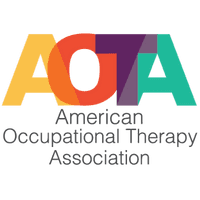Supporting Kids with ADHD in School: A Parent’s Guide to Accommodations That Help

As occupational therapists, we often meet parents who tell us: “My child is so bright, but school feels like a daily struggle.”
You might see your child build elaborate Lego structures or ask deep, thoughtful questions — yet receive notes home about being off-task, missing work, or having trouble following directions. You know they’re trying. But something about the school environment just isn’t clicking.
We want to start with reassurance: your child isn’t lazy or defiant — they’re overwhelmed.
Children with ADHD are constantly navigating a world that demands focus, impulse control, and organization — all skills rooted in the brain’s executive functioning system, which matures slowly over time. When their internal capacity doesn’t match external demands, stress builds. That stress often shows up as fidgeting, zoning out, frustration, or avoidance.
As Dr. Mona Delahooke reminds us, “Behavior is communication.” A child’s “won’t” is often a “can’t yet.”
How these challenges can show up in school
Every child with ADHD is unique, but common patterns often appear:
Trouble starting or completing assignments without reminders
Forgetting to turn in finished work
Difficulty focusing in large groups or noisy classrooms
Impulsive blurting, interrupting, or moving around the room
Emotional outbursts after school from “keeping it together” all day
Struggles with transitions, multi-step directions, or time management
These aren’t discipline problems — they’re regulation and executive functioning challenges. When we understand that difference, we can start to build supports that meet the child where they are.
What you might hear from teachers
When a child’s ADHD is impacting their day, feedback from teachers may sound like:
“He’s so bright but rushes through his work.”
“She gets distracted easily and needs reminders.”
“He talks out of turn and struggles to stay seated.”
“She forgets to bring the right materials.”
“He gets frustrated when things don’t go his way.”
For many parents, hearing this can feel defeating. But these comments are actually clues — indicators of where your child’s nervous system and learning environment may be out of sync.
Becoming your child’s advocate
Advocacy begins with understanding, not confrontation. When parents and schools work together, children win.
Here’s how you can start:
Request a meeting with your child’s teacher, counselor, or support staff. Share your observations and ask for theirs.
Document patterns. Note when your child seems most regulated or dysregulated — time of day, subject, environment.
Ask about formal supports. In the U.S., children may qualify for a 504 plan or IEP (Individualized Education Plan) that includes accommodations for ADHD.
Collaborate with curiosity. Use language like, “What strategies have you found help kids with attention differences?”
Share what works at home. Teachers appreciate insight into your child’s coping tools, sensory needs, and motivators.
When parents approach advocacy through curiosity and partnership, schools are more likely to respond with flexibility and compassion.
Types of accommodations that can help
Elementary School
Flexible seating (wobble stool, standing desk, cushion)
Visual schedules and checklists for routines
Extra time for tests or written work
Movement breaks or “helper jobs” between tasks
Positive reinforcement charts focused on effort, not just outcome
Simplified, step-by-step directions
Middle School
Regular check-ins with a trusted adult
Extra time and quiet environments for testing
Organizational tools (color-coded folders, planner apps)
Permission to use headphones or fidgets for focus
Reduced homework load when overwhelmed
Explicit teaching of study and planning strategies
High School
Extended deadlines when appropriate
Reduced workload or alternative assignments
Access to assistive technology (speech-to-text, reminders, note-taking tools)
Preferential seating to minimize distractions
Testing in a smaller or quiet space
Support from a learning specialist or counselor
Accommodations don’t lower expectations — they create access. They help your child demonstrate what they know without being limited by how their brain manages attention or organization.
Best practices for collaborating with school staff
Strong collaboration is built on mutual respect and communication.
Lead with empathy. Teachers care deeply, but they may not have specialized ADHD training. Your perspective matters.
Share progress updates. Let the team know when something is working at home or in class.
Use clear language. Instead of “He needs help staying focused,” try “He does best when assignments are broken into smaller steps.”
Recognize effort. A quick thank-you or note of appreciation strengthens the partnership.
Remember, the goal isn’t perfection — it’s progress and connection.
When to seek additional professional support
Sometimes, even with school accommodations, your child may need more tailored strategies. That’s where outside professionals can help:
Occupational Therapists (OTs) support regulation, focus, sensory processing, and executive functioning.
Psychologists or neuropsychologists can assess attention, memory, and processing patterns.
Speech-language pathologists help with communication and social understanding.
These professionals help build a bridge between how your child learns and what their environment demands.
How Kinspire can help
At Kinspire, our licensed pediatric occupational therapists specialize in supporting families of children with ADHD. We don’t just focus on sessions — we focus on daily life.
Through our Concierge OT model, you’ll receive:
Ongoing communication and personalized guidance
Strategies to navigate homework, transitions, and routines
Advocacy tools to help you collaborate with teachers
Expert insight into your child’s sensory and regulation needs
Because progress doesn’t happen once a week — it happens every day, in the moments that matter most.
💡 Ready to get started?
Book a free consultation with a Kinspire occupational therapist and discover how daily support can change your child’s experience at school — and your experience as a parent.




